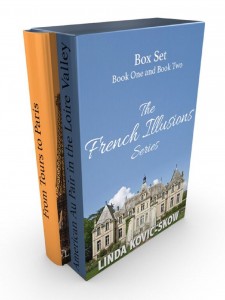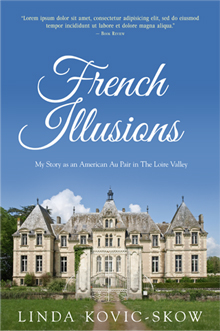Foreshadowing is a great way to hint to a reader that a future event will occur in your story. According to Wikipedia, “It is also sometimes used to arouse the reader.” The writer can do this with dialog or an action, and the “hint” often occurs at the end of a chapter or scene. You don’t want the reader to put the book down. You want the reader to turn the page because they “have” to find out what happens next.
With this in mind, I tried to foreshadow certain events in my books, especially regarding my relationship with Adam in my sequel, French Illusions: From Tours to Paris. In the following scene, Adam and I have only a few days left together before he returns home for the holidays. As you can see, the end of this chapter foreshadows possible problems upon his return.
 “We sauntered along a row of restaurants until Adam turned to me, his expression changing from blasé to brilliant in an instant. “Hey, why don’t we go to Café Jacques? He’s asked about you a couple of times and I know he’d love to see us.”
“We sauntered along a row of restaurants until Adam turned to me, his expression changing from blasé to brilliant in an instant. “Hey, why don’t we go to Café Jacques? He’s asked about you a couple of times and I know he’d love to see us.”
“Great idea! I wondered if we’d get a chance to see him before you left.”
Adam’s dimple materialized as he pulled me into his embrace. “We still have four more days before I leave. I don’t mind sharing you tonight, but I don’t think we should make any other plans after this.”
My spirits soared. “Sounds good to me. When you return in January, we’ll have plenty of time for our friends.”
A muscle twitched in Adam’s jaw and, for a split second, I wondered if he was keeping something from me. It disappeared swiftly, and when his lips covered mine, my thoughts muddled together and my concerns melted away.”
What do you think? Did I create a bit of intrigue here?

Yes, agree with what you are saying. I think foreshadowing is something that tends to come naturally when you are writing. For me, it is something I do instinctively, to set myself as the author up, to write the next chapter. I can see that it can also be useful from a reader’s perspective. Nica article
Good for you, Grant. I’m not sure it’s instinctual for me. Perhaps I’d feel differently if I wrote fiction.
Nicely done! I believe foreshadowing is as much fun for the author as it is for the reader. Or, I’d like to think so. 😉
Yes, Ingrid, I agree. These small hints keep both writers and readers on our toes 🙂
Yes, I think forehadowing is very important 🙂
Thanks for stopping by Christoph. We all should feel this way right?
It’s a great technique to involve the reader in the story, as it makes them feel like a part of something ‘bigger’ that’s about to happen.
I also use it sometimes in my mystery stories, and I’m glad you enjoy using as well 🙂
Thanks for stopping by Stef. Yes, I agree that foreshadowing is an especially useful tool with mystery stories – the backbone of that genre, as a matter of fact. It keeps the reader turning pages.
Foreshadowing is a tricky piece. Give away too much and there’s no point in reading on, but when you get just the right amount the magic happens.
Well said, Chris. The “hint” must be a subtle one, prompting the reader to want to turn the page. Tricky indeed 🙂
As a reader, I enjoy the subtle foreshadowing or especially if it can temporarily misdirect the reader. However, the constant use of it at the end of a chapter can become tiresome. I like when there is a natural pausing point as I don’t have the time to read directly through a novel in one sitting.
Yes, well said, Donna. Foreshadowing should not feel forced or repetitive. Placed sparingly throughout a book, it can add an element of intrigue, prompting the reader to turn the page.